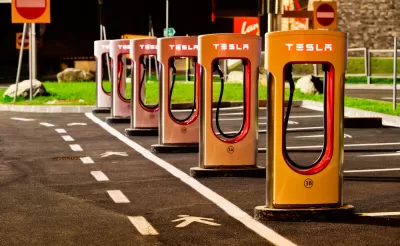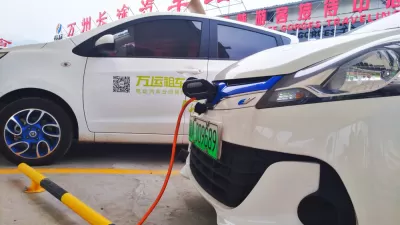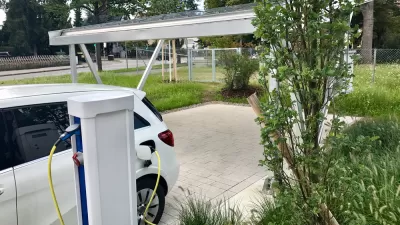U.S. sales of plug-in electric vehicles, including those with internal combustion engines, increased by 81 percent in 2018 over 2017. But if you remove the best-selling Tesla Model 3 from the mix, the increase drops to 11 percent.

"The 2018 numbers are in, and total U.S. EV sales came in at 361,307 for the year — up 81 percent over 2017 — according to the tracking website Inside EVs," reports Julia Pyper for Greentech Media (GTM) on Jan. 7. The number is expected to be less than 2 percent of total auto sales, but higher than one percent, where it has hovered for the prior two years.
Last year’s strong sales performance really came down to one thing: Tesla. The Silicon Valley automaker sold 139,782 units of the Model 3 in 2018, according to Inside EVs. Including the Model S and the Model X, Tesla was responsible for more than 50 percent of total plug-in vehicle sales last year.
Taking the Model 3 out of the mix, U.S. EV sales increased by only 11 percent last year, a poor showing by most standards.
Pyper talks with analysts who feel optimistic that other manufacturers will offer new models that are competitive with Tesla, which is important as some analysts forecast Tesla's sales to decline
“I don’t think 2019 is going to be all about the Model 3," said Chris Nelder, manager of Rocky Mountain Institute’s mobility practice. "There are a lot more manufacturers making a lot more EVs.”
There are several new mass-market EVs available with over 200 miles of electric range, such as the Kia Soul and Kia Niro. At the same time, brands such as Mercedes, BMW, Porsche, Jaguar and Audi are launching headline-grabbing high-performance electric cars — and putting real pressure on Tesla for the first time.
However, judging by the few electric vehicle models on display at the North American International Auto Show in Detroit on Sunday, and the great number of gas-powered SUVs, Associated Press auto writer Tom Krisher sees little reason to think that 2019 will be the year of the electric vehicle.
In addition, with General Motors' announcement last November that it will closing many of its car manufacturing plants and shift production toward their better-selling light truck lineup, the sixth best-selling EV in the U.S., the Chevy Volt, will cease production. The Chevy Bolt was #7 last year, according to Inside EVs.
Federal EV credit decreases
While the Trump administration has threatened to eliminate federal tax credits for all-electric and plug-in hybrid vehicles, as much as $7,500 per vehicle, and Senator John Barrasso, a Republican from Wyoming, introduced a bill on Oct. 6, 2018 to end the program and tax them instead, the credits will phase-out by design when manufacturers sell 200,000 plug-in models, as Tesla did last summer and General Motors last month.
As the federal subsidy decreases, what will be the impact on EV sales?
AP's Krisher reported earlier that Tesla dropped the price on its models by $2,000, in part because the federal credit dropped by 50 percent to $3,750 on Jan. 1, and will gradually end this year. The other reason: demand appears to be decreasing.
"They have for a long time had more demand than supply," said Michael Ramsey, research director at analysis firm Gartner. "It's becoming apparent that that dynamic is changing."
EV sales underperform in U.S.
Even with the spectacular sales of the Model 3, making it the best-selling luxury car and the fifth best-selling car in the U.S. last year, EV sales in the U.S. lag behind other nations.
"U.S. EV sales to date have been underwhelming," adds GTM's Pyper.
While launching an entirely new class of vehicles is no easy feat, China has seen adoption levels surge, while European countries lead on a per-capita basis.
The U.S. EV sector has seen incremental growth over the past several years, but it has yet to reach an inflection point. And sales actually saw a dip in 2015.
Future California sales
According to a new report from the Institute of Transportation Studies at the University of California at Davis, an upcoming zero-emissions fee could have a chilling effect on EV sales. The $100 annual "road improvement fee" in the Road Repair and Accountability Act of 2017 won't take effect until January 2020, but researcher Alan Jenn indicates it could damper sales by as much as 20 percent.
The report to the California legislature recommends the flat, annual fee be replaced with an vehicle-miles traveled fee applicable only to zero-emission vehicles.
Related in Planetizen:
- Electric Vehicle Incentives: A Tale of Two Countries: U.S. & Norway, December 30, 2018
Hat tip to Ed Mainland.
FULL STORY: US Electric Vehicle Sales Increased by 81% in 2018

Maui's Vacation Rental Debate Turns Ugly
Verbal attacks, misinformation campaigns and fistfights plague a high-stakes debate to convert thousands of vacation rentals into long-term housing.

Planetizen Federal Action Tracker
A weekly monitor of how Trump’s orders and actions are impacting planners and planning in America.

In Urban Planning, AI Prompting Could be the New Design Thinking
Creativity has long been key to great urban design. What if we see AI as our new creative partner?

King County Supportive Housing Program Offers Hope for Unhoused Residents
The county is taking a ‘Housing First’ approach that prioritizes getting people into housing, then offering wraparound supportive services.

Researchers Use AI to Get Clearer Picture of US Housing
Analysts are using artificial intelligence to supercharge their research by allowing them to comb through data faster. Though these AI tools can be error prone, they save time and housing researchers are optimistic about the future.

Making Shared Micromobility More Inclusive
Cities and shared mobility system operators can do more to include people with disabilities in planning and operations, per a new report.
Urban Design for Planners 1: Software Tools
This six-course series explores essential urban design concepts using open source software and equips planners with the tools they need to participate fully in the urban design process.
Planning for Universal Design
Learn the tools for implementing Universal Design in planning regulations.
planning NEXT
Appalachian Highlands Housing Partners
Mpact (founded as Rail~Volution)
City of Camden Redevelopment Agency
City of Astoria
City of Portland
City of Laramie





























